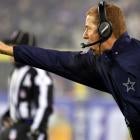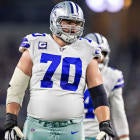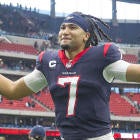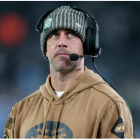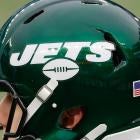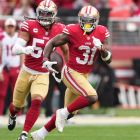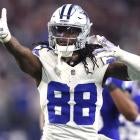No, it's not the reason the Dallas Cowboys lost the game but, yes, it helped the Dallas Cowboys lose the game. In order to land an upset against the defending Super Bowl champion New England Patriots, and in almighty Gillette Stadium, no less, the Cowboys needed to play near-perfect football.
When it was all said and done and the clock had hit all zeroes, they had done the exact opposite, burying themselves time and again with poor execution that included some of the worst special teams play you'll see this year. Things got that much worse for them, however, when phantom penalties began to appear -- namely two tripping calls that killed key drives.
The Cowboys filed both calls to the league's front office for review following the loss, and the NFL acknowledged to the club neither was valid, and neither should've been called, per multiple sources. Needless to say, this isn't the first time the Cowboys have heard such a confession, and after the fact when there's nothing that can be done about it.
Just ask Dez Bryant, because yes, he caught it and yes, the NFL admitted it.
The second tripping penalty called against the Cowboys on Sunday was even more damaging than the first, levied on All-Pro center Travis Frederick during a drive that might've finally given the Cowboys a chance to score their first touchdown. That is, of course, assuming they would've or could've, considering they struggled to do so all game, but the odds of finally achieving that mission and subsequently tying the game were torpedoed on third-and-1 with less than two minutes remaining in the contest. The Cowboys then failed to convert on third- and fourth-and-long, and Tom Brady went on to seal the victory for the Patriots thereafter.
Here's a clip of both calls, and you can see why the NFL had no choice but to admit the errors.
Yesterday, Tyron Smith & Travis Frederick were both penalized with Tripping Penalties.
— Cowboys Nation (@CowboysNation) November 25, 2019
I put them together in a Short Movie I call “Tyron & Travis Weren’t Tripping But The Refs Are” pic.twitter.com/U3WfQpmwU5
DeMarcus Lawrence, who has never been one to sink his teeth into his own tongue, took accountability for the loss, but also railed against the two tripping calls.
"I get tripped up every time, but it's cool," Lawrence told media after the game. "I'm not going to sit here and cry about it. If the refs want to call the bull----, let them call the bull----. It's all about what we do."
When asked specifically about his take on the penalties, though, Lawrence made his feelings scathingly clear.
"Come on," he said. "Everybody knows there was no such thing [as tripping on those calls] -- [no foot] was thrown out or that somebody was tripped. They can talk about it in the front office and figure out when they're going to start calling tripping calls, or when that call is even displayed. It's all up to them."
They did just that, and while the Cowboys can take solace in the NFL's confession, it comes attached to a bitter pill they must swallow, because that game is now over and their biggest chance at landing a signature win is out the window. This will also inevitably drive a deeper wedge between the club, its fans and NFL officials, with the first two having felt the sting of controversial calls quite a bit in recent history.
Each time, they helped decide the outcome of a game, but rarely in the Cowboys favor.
Insert your conspiracy theory here.









